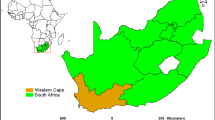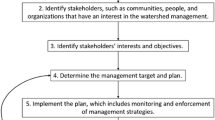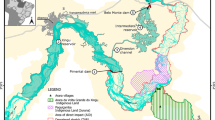Abstract
This article introduces an analytical framework to identify and structure paradigm shifts from flood protection towards flood risk management. The framework is divided into three levels of analysis: (i) the governance level, (ii) the institutional level, and (iii) the operational level. Each of these levels plays an important role during the development and operationalization of a paradigm shift. The framework allows scholars and practitioners to organize a large amount of data and information relating to such a shift in a given river basin. To illustrate the potential of the framework, it is applied to the case of the Lower Rhine in North Rhine-Westphalia, Germany. The results demonstrate how the different levels interact with each other and which elements constitute a barrier or driver influencing a paradigm shift. While institutions developed at higher management levels support a paradigm shift, the overall dominance of technical flood protection measures at the operational level constitutes a barrier to integrated flood risk management. Furthermore, a lack of joint action and multi-level cooperation constitutes a barrier at the governance level.
Similar content being viewed by others
Notes
In this context the term paradigm describes a set of fundamental assumptions of and views on the nature of a specific phenomenon. A flood management paradigm therefore is the view a society has on floods in general and on how to deal with them in particular.
References
Andersson KP, Ostrom E (2008) Analyzing decentralized resource regimes from a polycentric perspective. Policy Sci 41:71–93
Becker G (2009) Germany: transitions in flood management in the Rhine basin. In: Huitema D, Meijerink S (eds) Water policy entrepreneurs. Edward Elgar Publishing, Cheltenham, pp 325–348
Biswas AK (2004) Integrated water resources management: a reassessment. A water forum contribution. Water Int 29(2):248–256
Cioc M (2002) The Rhine: an eco-biography, 1815–2000. University of Washington Press, Seattle
IPCC - Intergovernmental Panel on Climate Change (2014) Climate Change 2014: impacts, adaptation, and vulnerability. Contribution of Working Group II to the Fifth Assessment Report of the Intergovernmental Panel on Climate Change
Cundill G, Fabricius C (2010) Monitoring the governance dimension of natural resource co-management. Ecol Soc 15(1):15
De Bruijn KM, Green C, Johnson C, McFadden L (2007) Evolving concepts in flood risk management: searching for a common language. In: Begum S, Stive MJF, Hall JW (eds) Flood risk management in Europe. Springer, Dordrecht, pp 61–75
Disse M, Engel H (2001) Flood events in the Rhine basin: genesis, influences and mitigation. Nat Hazards 23:271–290
EC – European Commission (2007) Directive 2007/60/EC of the European Parliament and of the Council of 23 October 2007 on the assessment and management of flood risks
Folke C, Hahn T, Olsson P, Norberg J (2005) Adaptive governance of social-ecological systems. Annu Rev Environ Resour 30:441–473
Geilen N, Jochems H, Krebs L, Muller S, Pedroli B, van der Sluis T, van Looy K, van Rooij S (2004) Integration of ecological aspects in flood protection strategies: defining an ecological minimum. River Res Appl 20:269–283
Gilvear DJ, Spray CJ, Casas-Mulet R (2013) River rehabilitation for the delivery of multiple ecosystem services at the river network scale. J Environ Manag 126:30–43
Godden L, Kung A (2011) Water law and planning frameworks under climate change variability: systemic and adaptive management of flood risk. Water Resour Manag 25:4051–4068
Grünewald U (2005) Vom Hochwasser-“Schutzversprechen” zum Hochwasser-“Risikomanagement”. In: Jüpner R (ed) Hochwassermanagement. Magdeburger Wasserwirtschaftliche Hefte 1, Shaker Verlag
GWP - Global Water Partnership Technical Advisory Committee (2000) Integrated water resource management. Technical Background Paper No. 4. Global Water Partnership, Stockholm
Hegger DLT, Green C, Driessen P, Bakker M, Dieperink C et al (2013) Flood risk management in Europe: similarities and differences between the STAR-FLOOD consortium countries. STAR-FLOOD Consortium, Utrecht
Hegger DLT, Driessen PPJ, Dieperink C, Wiering M, Raadgever GTT, van Rijswick HFMW (2014) Assessing stability and dynamics in flood risk governance. Water Resour Manag 28:4127–4142
Heiland P (2002) Vorsorgender Hochwasserschutz durch Raumordnung, interregionale Kooperation und ökonomischen Lastenausgleich. Schriftenreihe WAR, 143
Hey DL, Philippi NS (1995) Flood reduction through wetland restoration: the upper Mississippi river basin as a case history. Restor Ecol 3(1):4–17
Huntjens P, Pahl-Wostl C, Grin J (2010) Climate change adaptation in European river basins. Reg Environ Chang 10(4):263–284
Huntjens P, Pahl-Wostl C, Rihoux B, Schlüter M, Flachner Z, Neto S, Koskova R, Dickens C, Kiti IN (2011) Adaptive water management and policy learning in a changing climate: a formal comparative analysis of eight water management regimes in Europe, Africa and Asia. Environ Policy Gov 21(3):145–163
ICPR – International Commission for the Protection of the Rhine (2002a) Hochwasservorsorge – Maßnahmen und ihre Wirksamkeit. ICPR, Koblenz
ICPR – International Commission for the Protection of the Rhine (2002b) IKSR-Bestandsaufnahmen 2000 – Zusammenfassende Bewertung der biologischen Untersuchungen. ICPR, Koblenz
Kasemir B, Jäger J, Jaeger CC, Gardner MT (2003) Public participation in sustainability science. A handbook. Cambridge University Press, Cambridge
Klinke A, Renn O (2002) A new approach to risk evaluation and management: risk-based, precaution-based, and discourse-based strategies. Risk Anal 22(6):1071–1094
Knieper C, Holtz G, Kastens B, Pahl-Wostl C (2010) Analyzing water governance in heterogeneous case studies. Experiences with a database approach. Environ Sci Policy 13(7):592–603
Knüppe K, Pahl-Wostl C (2011) A framework for the analysis of governance structures applying to groundwater resources and the requirements for the sustainable management of associated ecosystem services. Water Resour Manag 25:3387–3411
Kruse S (2010) Vorsorgendes Hochwassermanagement im Wandel. Ein sozial-ökologisches Raumkonzept für den Umgang mit Hochwasser. VS Verlag für Sozialwissenschaften, Wiesbaden
Krysanova V, Dickens C, Timmermann J, Varela-Ortega C et al (2010) Cross-comparison of climate change adaptation strategies across large river basins in Europe, Africa and Asia. Water Resour Manage 24(14):4121–4160
Kuks SMM (2005) The evolution of national water regimes in Europe. Transitions in water rights and water policies. Paper for the Conference on “Sustainable Water Management: Comparing Perspectives from Australia, Europe and the United States”, 15–16 September 2005, Canberra
Lebel L, Manuta JB, Garden P (2011) Institutional traps and vulnerability to changes in climate and flood regimes in Thailand. Reg Environ Chang 11:45–58
Merz B, Emmermann R (2006) Zum Umgang mit Naturgefahren in Deutschland. Vom Reagieren zum Risikomanagement GAIA 15(4):265–274
Merz B, Bittner R, Grünewald U, Prioth L (eds) (2011) Management von Hochwasserrisiken. Schweizerbart, Stuttgart
Mitchell JK (2003) European river floods in a changing world. Risk Anal 23(3):567–574
Opperman JJ, Galloway GE, Fargione J, Mount JF, Richter BD, Secchi S (2009) Sustainable floodplain through large-scale reconnection to rivers. Science 326:1487–1488
Ostrom E (2005) Understanding institutional diversity. Princeton University Press, New Haven
Ostrom E (2010) Polycentric systems for coping with collective action and global environmental change. Glob Environ Chang 20(4):550–557
Pahl-Wostl C (2009) A conceptual framework for analyzing adaptive capacity and multi-level learning processes in resource governance regimes. Glob Environ Chang 18:354–365
Pahl-Wostl C, Sendzimir J, Jeffrey P, Aerts J, Berkamp G, Cross K (2007a) Managing change toward adaptive water management through social learning. Ecol Soc 12(2):30
Pahl-Wostl C, Craps M, Dewulf A, Mostert E, Tabara D, Taillieu T (2007b) Social learning and water resources management. Ecol Soc 12(2):5
Pahl-Wostl C, Holtz G, Kastens B, Knieper C (2010) Analyzing complex water governance regimes: the management and transition framework. Environ Sci Policy 13:571–581
Pahl-Wostl C, Becker G, Knieper C, Sendzimir J (2013) How multilevel societal learning processes facilitate transformative change: a comparative case study analysis on flood management. Ecol Soc 18(4):58
Petry B (2002) Coping with floods: complementarity of structural and non-structural measures. In: Wu B, Wang ZY, Wang G, Huang GGH, Fang H, Huang J (eds) Flood defence 2002. Science Press, New York
Rijke J, van Herk S, Zevenbergen C, Ashley R (2012) Room for the River: delivering integrated river basin management in the Netherland. Int J River Basin Manag 10(4):369–382
Rowe G, Frewer LJ (2000) Public participation methods: a framework for evaluation. Sci Technol Hum Values 25(1):3–29
Samuels P, Klijn F, Dijkman J (2006) An analysis of the current practice of policies on river flood risk management in different countries. Irrig Drain 55:141–150
Schanze J (2006) Flood risk management – a basic framework. In: Schanze J, Zeman E, Marsalek J (eds) Flood risk management: hazards, vulnerability and mitigation measures. Springer, Dordrecht, pp 1–20
Sendzimir J, Magnuszewski P, Flachner Z, Balogh P, Molnar G, Sarvari A, Nagy Z (2008) Assessing the resilience of a river management regime: informal learning in a shadow network in the Tisza River Basin. Ecol Soc 13(1):11
Smith M, Barchiesi S (2009) Environment as infrastructure – Resilience to climate change impacts on water through investments in nature. Water Programme, International Union for Conservation of Nature (IUCN), Gland
Smits AJM, Nienhuis PH, Leuven RSEW (2000) New approaches to river management. Backhuys, Leiden
Vörösmarty CJ, McIntyre PB, Gessner MO, Dudgeon D, Prusevich A, Green P, Glidden S, Bunn SE, Sullivan CA, Reidy Liermann C, Davies PM (2010) Global threats to human water security and river biodiversity. Nature 467:555–561
WMO - World Meteorological Organization (2006a) Environmental aspects of integrated flood management. APFM Technical Document No. 3, Flood Management Policy Series
WMO - World Meteorological Organization (2009) Integrated flood management. Concept Paper. WMO-No. 1047
WMO – World Meteorological Organization (2006b) Social aspects and stakeholder involvement in integrated flood management. APFM Technical Document No. 4, Flood Management Policy Series
WMO – World Meteorological Organization (2007) The role of land-use planning in flood management. APFM Technical Document No. 12, Flood Management Tool Series
WMO – World Meteorological Organization (2012a) Conservation and restoration of rivers and floodplains. APFM Technical Document No. 18, Flood Management Tool Series
WMO – World Meteorological Organization (2012b) Flood proofing. APFM Technical Document No. 20, Flood Management Tool Series
Young OR (2002) The institutional dimensions of environmental change: fit, interplay and scale. MIT Press, Cambridge
Acknowledgements
The authors want to thank Claudia Pahl-Wostl for giving meaningful advice during the research period and the German Research Foundation for project funding.
Author information
Authors and Affiliations
Corresponding author
Ethics declarations
Funding
The study was part of the research project WaterNeeds (http://www.waterneeds.uni-osnabrueck.de/) funded by the German Research Foundation.
Conflict of Interest
The authors declare that they have no conflict of interest.
Electronic supplementary material
Below is the link to the electronic supplementary material.
ESM 1
(PDF 204 kb)
Rights and permissions
About this article
Cite this article
Thomas, F., Knüppe, K. From Flood Protection to Flood Risk Management: Insights from the Rhine River in North Rhine-Westphalia, Germany. Water Resour Manage 30, 2785–2800 (2016). https://doi.org/10.1007/s11269-016-1323-9
Received:
Accepted:
Published:
Issue Date:
DOI: https://doi.org/10.1007/s11269-016-1323-9




